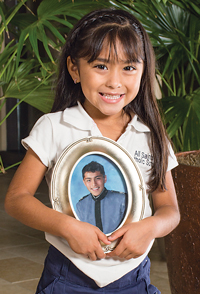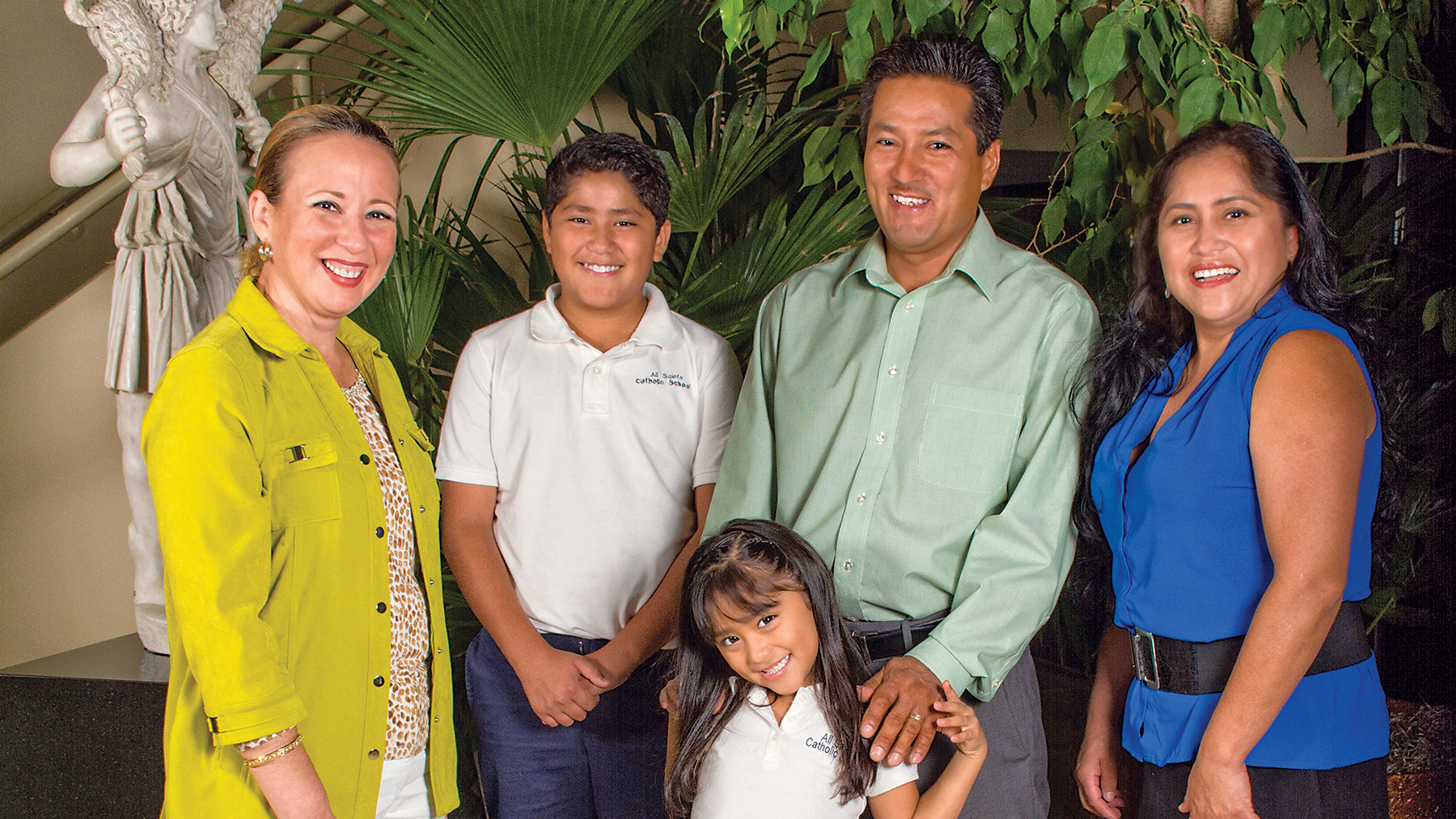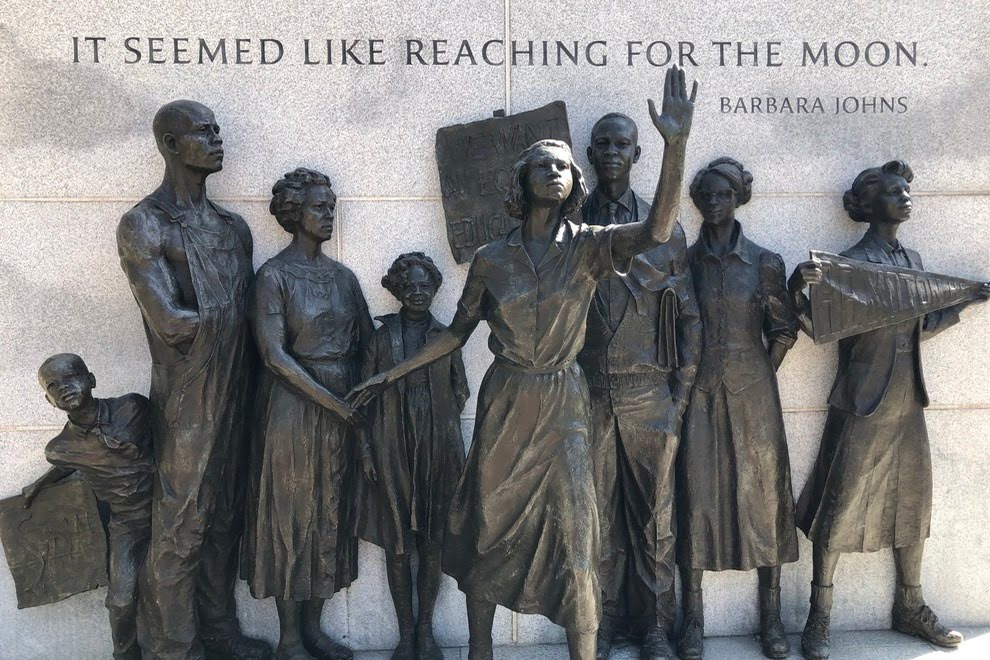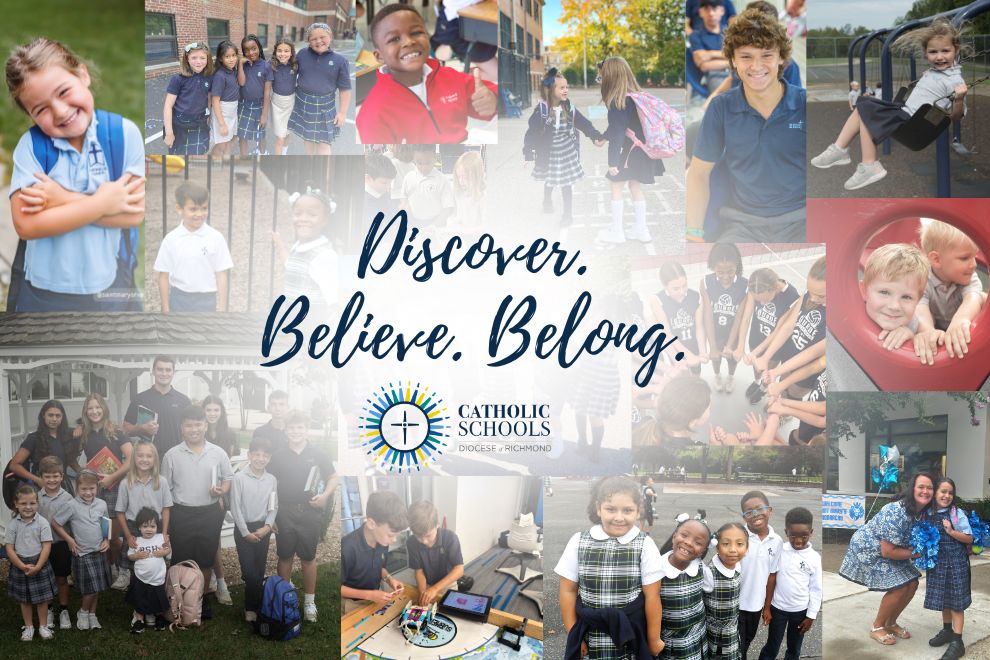The Garcia family with the director of the
Segura Educational Initiative, Maria Baquerizo (left).
Julio Garcia and his wife, Maribel, wanted their three children to have a Catholic education, but knew they couldn’t afford the tuition for private school. Julio works in construction and his wife tends to the family at home. Parishioners at Sacred Heart Church in Richmond since moving to the city thirteen years ago, the couple believed a Catholic education would offer their children excellent academics, values that may not be taught in public schools, and an education in the Catholic faith, which was very important to the family.
After talking with Maria Baquerizo, Segura director for the Catholic Diocese, the couple was able to find financial assistance through the Segura Educational Initiative for Children. The program was founded in 2010 after Bishop Francis Xavier DiLorenzo of Richmond recognized the need to help immigrant families regardless of their ability to afford tuition.
To be eligible for tuition assistance, Latino families must be Catholic, have an annual income of at least $10,000, and apply for financial aid through FACTS Grant and Aid program. Tuition assistance is based on the family’s financial capability and the cost of tuition.

Many parents in the Richmond area like the Garcias would love to send their children to private school but have trouble meeting the requirements for tuition. That’s where a school’s financial aid and scholarship programs make a big difference.
The Virginia Association of Independent Schools oversees ninety-one private schools in Virginia. Approximately twenty of those schools are in the Richmond area. “All of our schools offer need-based financial aid,” says Betsy Hunroe, the association’s executive director. “Of the Richmond-area schools, around 30 percent of current students on average are using financial aid.”
After qualifying for the Segura program in 2011, the Garcias enrolled their two sons in All Saints, Sacred Heart’s parish school. Today their oldest son, Julio Cesar, is in Benedictine College Preparatory through a scholarship he obtained after graduating from All Saints, and the youngest sibling, Abril has started kindergarten at All Saints. She attends with her brother Carlos who will be graduating this year.
What the Garcias really enjoy about Catholic school is the “teaching of values and faith, like respect and service to others,” they say. Julio Cesar, a soccer player, says he is appreciative of the sports program and Carlos likes the “general atmosphere,” he says. “There is a sense of community and belonging.”
Typical families that apply for Segura have approximately three children and an average income of $30,000 a year. This year, the program is providing assistance to 300 students and more than a hundred families.
“Our first Segura student has graduated from the program this year and is now attending VCU,” says Baquerizo. “She plans to become a surgeon.”
Families usually find that the cost of a private education for one school year can range from $6,000 to upwards of $25,000, depending on the school and the grade level.
“We know the cost of an independent school education represents a significant investment and often sacrifice for the family,” says Charley Stillwell, headmaster at St. Christopher’s School. “We want to make sure that all families know we are an educational system to consider, even if they don’t have the money to afford the full cost.”
The subject of financial aid is mentioned at the beginning of the school’s kindergarten orientation. “Lots of our families apply for aid,” he says. “It’s a regular occurrence here. Roughly 30 percent of our families are receiving some form of assistance.”
Stillwell hopes to do all that he can to break down the “misconception that only people with significant economic means can come to the school,” he says. “We really want people to know we are a school for the entire Richmond community. It’s important that we offer educational experience to kids across all of greater Richmond and also across all different economic levels.”
This school year, St. Christopher’s is offering a total of $2.9 million in financial aid. “We always have more need than we can fully meet, but we work hard to make sure lots of families think about coming to St. Christopher’s,” he says.
Funding for financial aid comes from the school’s endowment for assistance and other support. Like other private schools in the area, St. Christopher’s works with a neutral third-party evaluator, School and Student Services, overseen by the National Association of Independent Schools, to evaluate a family’s ability to support their child’s education. “They will let us know how much they feel the family should be able to afford on education,” he says. “With our financial aid, we try to grant money to those families as close to their full need as we can. We like every family to be involved in some economic way so there is a partnership.”
Approximately 20 percent of the students at The Steward School are receiving financial aid. “We do have an annual financial aid budget of $1.2 million,” says
Lisa Dwelle, Steward’s associate head of school, finance, and operations. “We want to make education available to as many students as we can. Financial aid and scholarships are part of that. We meet as much of their need as we possibly can.”
The school offers two merit-based Debbie Robson Merit Scholarships for rising ninth graders that pay 100 percent tuition for all four years of upper school at Steward, assuming the student maintains a certain criteria.
Financial aid and admission are separate but parallel processes at the school. “While our admission office does provide an overview of information on financial aid, all of the financial aid goes through the business office,” Dwelle says. “All of the personal information is very confidential. It is not shared with anyone else in the organization.”
The Steward School is very hands-on with its application process. “We spend a lot of time with every family and walk them through the process. It’s a very personalized approach,” Dwelle says. “We take great pride in that one-on-one service to families.”
She definitely sees an increase in financial aid applications as well as financial awards in the last five years. “I think that is pretty consistent from school to school,” she says. “We will assess everyone’s needs. We can go up to 100 percent of need depending on the circumstances.”
The Catholic Diocese of Richmond oversees twenty-nine Catholic schools in the state, including ten in the greater Richmond area. “Two of the schools in the Richmond area – St. Gertrude High School and Benedictine College Preparatory – are run by religious orders, so they are not directly underneath the Diocese,” says Annette Parsons, chief administrator of the office of Catholic Education for the Diocese.
The Diocese offers a significant number of need-based scholarships. Many are offered through the McMahon Parater Foundation, an endowment for Catholic schools. “We take the monies we receive and we distribute to the schools,” Parsons says.
Both Catholic and non-Catholic students are eligible for the scholarships. Families must apply for financial support through FACTS Grant & Aid Assessment. “The amount of support is determined by the student’s calculated need,” Parsons says, noting the scholarships are for elementary through high school students.
Scholarships are also provided through parish support for Catholic students. “Each school has its own funding packages with money it raised during the year to help with tuition,” Parsons says. scholarships for low-income new students at non-public schools. “It’s available to students who transfer in from public schools and from out of state,” Parsons says, noting that individual or business donors receive a 65 percent tax credit. The Diocese’s McMahon Parater Foundation for Education has been approved by the Virginia Department of Education to receive donations under this program and to distribute scholarships to qualifying students who attend one of the schools in the Diocese.
The need for financial aid continues to grow throughout the greater Richmond area. “It’s a challenge with all the other expenses pulling at the family,” Parsons says. “We have tried to do everything we can to help families if this is their choice. We don’t want money to be a factor in accessing this type of education.”
Last year, the Diocese gave out $2.4 million in scholarships in the greater Richmond area and still had $3 million in need that couldn’t be met. In the last five years, the Diocese has been very intentional in its outreach to Latino families. “Many of them are operating well below the poverty level,” Parsons says.
The Segura program helps address one of the main factors in the cycle of poverty: education, according to Baquerizo. “Most of the students have parents who don’t speak English well and can’t help with homework. Many are uneducated. We’re helping to break the cycle by educating the young.”
The Garcias are thrilled with Seguro and their children’s education track. “What we love about the education our children receive at All Saints is that the school helps with their spiritual formation, not just academics, but as whole individuals, fostering sensitivity towards others and service to others,” they said.





